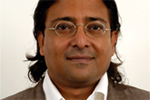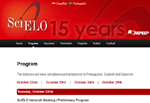Currently there is a varied panorama of university rankings at different levels – international, regional and national – and the national ones show their importance by being more in tune with the national context than the international rankings, and even use additional sources to rank the Institutions of Higher Learning in their respective countries. … Read More →
From lists to rankings
Based on Umberto Eco’s book “The Vertigo of Lists”, this blog post recalls the historical origin of lists, discussing their evolution to today’s sophisticated technological artifacts of information organization, and culminating in the emergence of global hierarchical listings showing the positioning of universities, also known as rankings. … Read More →
Integrity in research and the role of the institution: the time has come!
In highlighting the importance of holding the 4th World Conference on Research Integrity in Brazil in 2015, Sonia Vasconcelos emphasizes the recognition that the Global Research Council gives to the relevance of scientific integrity in funding, production and evaluation of research, and sees as possible the support of institutions so that scientific integrity may also become part of the culture of the training of graduate and undergraduate students. … Read More →
Only one month left until the SciELO 15 Years Conference
The program brings together researchers and experts that study and actively participate in the contemporary issues and in the future of editing, publishing, indexing, dissemination and evaluation of academic journals. It also brings together those in public policy, and in products and services that influence the development of journals. … Read More →
How much does it cost to publish in Open Access?
Open Access (OA) publication has become the accepted way of providing society with an idea of the public funds used to finance research. Open Access publication does not have a zero cost attached to it. It is however, put forward as a more economical model than journals which are financed by subscriptions. This post analyzes the financing of OA publication and puts forward business models which are seen as sustainable. … Read More →
UNESCO Guidelines provide a detailed review of Open Access
UNESCO has recently published the UNESCO Policy guidelines for the development and promotion of open access, whose objective is to promote Open Access in its Member States. The Guidelines contribute to the understanding of the most important aspects of Open Access so that countries and their institutions may choose appropriate policies and link them to their national research systems. … Read More →
Interview with Cicilia K. Peruzzo
With 50 years since the creation of the academic discipline of Communication Science in Brazil, what assessment can be made today of the successes and challenges of the field? Currently there are 64 graduate course in the country, while there were 6 in the 80‘s.The journal Intercom, the first academic journal in Communication in Brazil to be made available in open access, is an exciting editorial project that corresponds to an important part of this process of the development of the field. … Read More →
Interview with Susana I. Córdoba de Torresi
Susana I. Cordoba de Torresi, from the Brazilian Chemical Society discusses the mission, achievements and challenges of the Society’s journals, from having them ranked in the national Qualis system, to how SciELO has improved their visibility. … Read More →
Ask the Speaker
The Program of the SciELO 15 Years Conference focuses on the analysis and the dialogue concerning the state of the art in the field of scholarly publication, and conference delegates are invited to add value to this event by sending questions and comments to the conference speakers using the form which is available on the conference website. Take part! Send your questions, doubts, concerns and opinions! … Read More →
Pinacoteca of São Paulo: some art history of Brazil and of Jardim da Luz
To the participants of SciELO 15 years Conference, we recommend a visit to Pinacoteca do Estado de São Paulo inaugurated in 1905. The building designed by Ramos de Azevedo houses 5000 works including paintings, sculptures, drawings, prints, and photographs. The collections will certainly please the visitor, providing a significant sample of Brazilian art of the nineteenth century. … Read More →
Interview with Euan Adie, CEO of altmetric.com
Altmetrics is something that cannot be ignored. Based on the online monitoring of social networks in order to track the impact of academic publications, this new field is experiencing a rapid surge in interest. In an interview given exclusively to the SciELO in Perspectives blog, various aspects of Altmetrics are addressed by Euan Adie – CEO of altmetric.com. Euan will also be one of the speakers at the SciELO 15 Years Conference. … Read More →
Open access articles are here to stay: in less than 10 years nearly 50% of articles worldwide can be accessed this way
Publication sponsored by the European Commission, which highlights the role of SciELO in Brazil and the southern hemisphere, estimates that 50% of scholarly articles in the world are available in open access. Researchers like Stevan Harnad calculate this rate by 32%. Methodological differences explain the discrepancy, but the results achieved in a decade show no reversal on this trend. … Read More →
Interview with Indrajit Banerjee, Director of the UNESCO Information Society Division
To achieve the goal of open and inclusive knowledge societies, different approaches and strategies were adopted by UNESCO. In this interview, Indrajit Banerjee highlights that SciELO’s decentralized cooperative platform provides the context for a country to take charge of the process of Open Access publishing. … Read More →
Agenda for the Discussion on the Future Development of the SciELO Network
The national coordinating bodies of the SciELO Network are conducting, by mutual agreement, a working agenda to define the priority lines of action for the coming years aimed at improving the journals and the SciELO collections. The lines of action will be debated and approved during the face-to-face meeting of the network which will take place during the SciELO 15 Years Conference. … Read More →
Interview with Vincent Larivière
Bibliometrics/Scientometrics is at the heart of information science and It is important to recall the various limitations of bibliometric indicators – warns Vincent Larivière. The journal Impact Factor provides a useful “holistic” indication of the relative position of a journal within a subfield. Most researchers outside Library and Information Science have no clue on its actual limitations! … Read More →



























Recent Comments